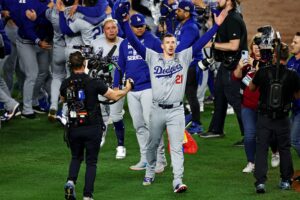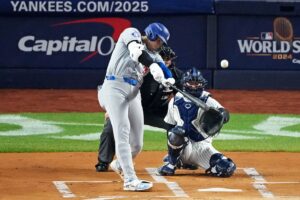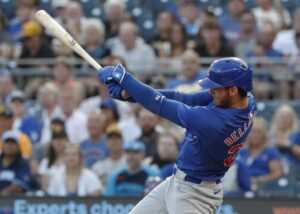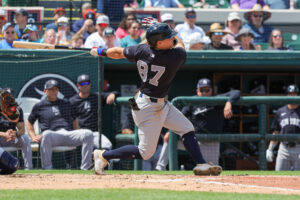The 2010s. An era that was supposed to bring endless amounts of human progression and detailed technology. Whether humanity succeeded in that department is one’s own opinion. However, what is true is that baseball continued to survive and thrive. Millions of people attended games and fans watched from all over the world. MLB.TV helped to bring the games into homes where television might not have been easily accessible. So, it can be said that technology found its foothold in the baseball world. For the 2010s Atlanta Braves, the roller coaster never stopped.
The beginning of the decade saw massive success. The team made the playoffs thrice in four seasons. Then, they suffered through a rebuilding process. Fortunately, this has proved to be quite the success, as the last few seasons have been tremendous. No longer is this franchise the Frankenstein’s monster of the late 2000s. They have transformed into the dominant force that they once were. However, it has not been without pain. Let’s turn back the clock a few years and rediscover the making of the new Braves.
Braves by Decade: 2010s, Pt. 1
2010: Returning to the Postseason
In 2010, everyone was on edge. Four long years had passed since the team had been to the playoffs. To top it all off, manager Bobby Cox announced that it would be his final season. So, the players were doubly pressured for success. Thankfully, they responded, and they found themselves back in the postseason. While the offense was nothing to write home about, the pitching was fantastic. Tim Hudson found his groove once more (17-9, 2.83 ERA, 138 ERA+). He was joined by Tommy Hanson (10 wins, 3.33 ERA, 117 ERA+) and Derek Lowe (16-12, 4.00 ERA).
As good as the rotation was, the bullpen was even better. Nobody had an ERA over three. Former All-Star Billy Wagner closed his big league career in style (7-2, 1.43 ERA, 275 ERA+, 37 SV). Accompanying him were Jonny Venters, Peter Moylan, Takashi Saito, and Eric O’Flaherty. Combined, these four went 15-11 with a 2.51 ERA. Furthermore, the season was notable for the debut of Craig Kimbrel. His 0.44 ERA and 914 ERA+ in 21 games spoke to his future. Unfortunately, the Braves lost the NLDS in four games. The playoff bug had bitten once more.
2011: The Atlanta Braves Miss By a Sliver
In 2011, the Braves looked to return to the postseason under new manager Fredi Gonzalez. The season was eerily similar to the previous one. The offense struggled (.243 team average) while the pitching carried the team (3.48 team ERA). Hudson led the staff (16-10, 3.22 ERA, 119 ERA+). Jair Jurrjens had a terrific year, earning an All-Star nod (13-6, 2.96 ERA, 129 ERA+). However, Lowe had one of his worst seasons (9-17, 5.05 ERA, 76 ERA+, 212 hits in 187 innings pitched).
That being said, the bullpen remained the brightest star. Kimbrel broke out, winning Rookie of The Year honors. He saved 46 games, posted a 2.10 ERA, and a 183 ERA+. Not to be outdone, Venters and O’Flaherty put up great numbers. Together, they went 8-6 with a 1.45 ERA. O’Flaherty was especially impressive, allowing a miniscule eight earned runs. Respectable seasons from Scott Linebrink and George Sherrill topped everything off. In short, the bullpen was the team’s greatest strength. Unfortunately, it wasn’t enough to keep them from losing the final game to the Philadelphia Phillies.
2012: A Controversial Ending
2012 marked the team’s return to postseason play. Unfortunately, that trip was marred by one of the most controversial umpiring calls in Braves’ history. In the first-ever NL Wild Card Game, they took on the St. Louis Cardinals. During the game, an infield fly rule was called with the Braves in a major scoring position. The problem was that the ball had dropped in the middle of the outfield. Fans were irate, throwing bottles and other items onto the field. It was a mess of controversy and malice.
However, the team did have other things to look at regarding that season. For the third straight year, the offense sank while the pitching soared. Bright spots with the bat included Jason Heyward (27 HR, 117 OPS+), Chipper Jones, (.287 avg, 124 OPS+), and Martin Prado (.301 avg, 186 hits). Newcomer Michael Bourn stole 42 bases and hit .274. The rest of the group was mediocre to simply okay. Freddie Freeman hit 23 homers. However, sour years from Dan Uggla and Brian McCann pushed the offense ever downward.
In contrast, the pitching was anything but off. Hudson won 16 more games. Brandon Beachy broke out with a 2.00 ERA in 13 games. The bullpen continued its crisp work. Kris Medlen went 10-1 with a 256 ERA+ in 50 games. The big three (Kimbrel, Venters, & O’Flaherty) were also terrific. Kimbrel saved 42 more games, posting a 399 ERA+. There were some issues in the staff, but overall, they were great. Sadly, they could not overcome that controversial umpiring decision.
2013: Joy & Anguish
In 2013, the Braves won their first division title in eight years. Using a power packed offense and precise pitching, they dominated the NL East. The bats, while not terrific for average, still launched baseballs a very long way. Their 181 homers led the league. New Brave Justin Upton endeared himself to the team with 27 bombs. Freeman had 23, Uggla had 22, and Brian McCann had 20. Breakout star Evan Gattis added 21. Unfortunately, the team’s ability to hit for contact was not elite. 1,354 hits placed them 10th in the league.
Thankfully, the pitching was right there to pick them up. They paced the league in categories like ERA and runs allowed. Medlen and Minor led the staff, combining for 28 wins. Both put up ERAs in the low 3.00 range. Julio Teheran continued on an upward trajectory (14-8, 3.20 ERA). Kimbrel blistered his way to a league-leading 50 saves. Setup man Anthony Varvaro was excellent as well (3-1, 2.82 ERA, 133 ERA+). Mid-inning relief came in the form of David Carpenter and Luis Avilan. Both posted ERAs in the mid-ones. Sadly, many of these same men had bad postseasons. The Braves lost the NLDS to the Los Angeles Dodgers.
2014: Poor Offense, Good Pitching
The following season, everything went bad offensively. The power disappeared, leaving the team with nothing at the plate. The pitching, while once again terrific, couldn’t carry them this time. However, there were bright moments. Teheran was selected to his first All-Star game. Kimbrel saved 47 games and broke John Smoltz’s all-time franchise save record. Newcomer Aaron Harang was solid. The bullpen as a whole was respectable but they weren’t quite the dominant force of the previous season.
The issues all lay in the offense. A .241 team average was 11th overall. Nobody hit over .300. Justin Upton launched 29 more homers and batted .270. Freeman hit .288, continuing his consistent work. Unfortunately, those were the only bright spots. Uggla was so bad in 48 games that he got traded. B.J. Upton hit .208. Chris Johnson had a massive fall from grace. He hit over .300 the previous season. In 2014, he hit .263. In short, the Braves were right back on the outside looking in. They missed the postseason.
Main Photo: Embed from Getty Imageswindow.gie=window.gie||function(c){(gie.q=gie.q||[]).push(c)};gie(function(){gie.widgets.load({id:’PkMhS0esT89pbXJF7Ikcjg’,sig:’MIkALXUFEv6DU5kMBBrvBbt17pNpAM0WM0E7CAuOJ18=’,w:’594px’,h:’417px’,items:’98663276′,caption: true ,tld:’com’,is360: false })});
Players/Coaches Mentioned: Bobby Cox, Tim Hudson, Tommy Hanson, Derek Lowe, Billy Wagner, Jonny Venters, Peter Moylan, Takashi Saito, Eric O’Flaherty, Craig Kimbrel, Brandon Beachy, Kris Medlen, Fredi Gonzalez, Jair Jurrjens, Scott Linebrink,George Sherrill, Jason Heyward, Michael Bourn, Freddie Freeman, Dan Uggla,Brian McCann, Brandon Beachy, Kris Medlen, Justin Upton, Evan Gattis, Julio Teheran, Anthony Varvaro, David Carpenter, Luis Avilan,John Smoltz,Aaron Harang, B.J. Upton, and Chris Johnson






